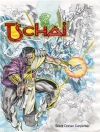In 1933, Chatto & Windus agreed to publish Samuel Beckett’s
More Pricks Than Kicks, a collection of ten interrelated stories—his first published work of fiction. At his editor’s request, Beckett penned an additional story, ‘Echo’s Bones’, to serve as the final piece. However, he’d already killed off several of the characters—including the protagonist, Belacqua—throughout the book, and had to resurrect them from the dead. The story was politely rejected by his editor, as it was considered too imaginatively playful, too allusive, and too undisciplined—qualities now recognized as quintessentially Beckett. As a result, ‘Echo’s Bones’ (not to be confused with the poem and collection of poems of the same title) remained unpublished—until now, nearly eight decades later.
This little-known text is introduced by the preeminent Beckett scholar, Dr. Mark Nixon, who situates the work in terms of its biographical context and textual references, examining how it is a vital link in the evolution of Beckett’s early work. Beckett confessed that he included ‘all I knew’ in the story. It harnesses an immense range of subjects: science, philosophy, religion, literature; combining fairy tales, gothic dreams, and classical myth. This posthumous publication marks the unexpected and highly exciting return of a literary legend.
关于作者
Samuel Beckett (1906-1989), one of the leading literary and dramatic figures of the twentieth century, was born in Foxrock, Ireland and attended Trinity College in Dublin. In 1969, Beckett was awarded the Nobel Prize in Literature and commended for having ‘transformed the destitution of man into his exaltation.’
Mark Nixon is Reader in Modern Literature at the University of Reading, where he is also the Director of the Beckett International Foundation. He has published widely on Samuel Beckett’s work, and is an editor of the Journal of Beckett Studies, a member of the editorial board of Samuel Beckett Today/Aujourd’hui, and Co-Director of the Beckett Digital Manuscript Project. He is the current President of the Samuel Beckett Society.












